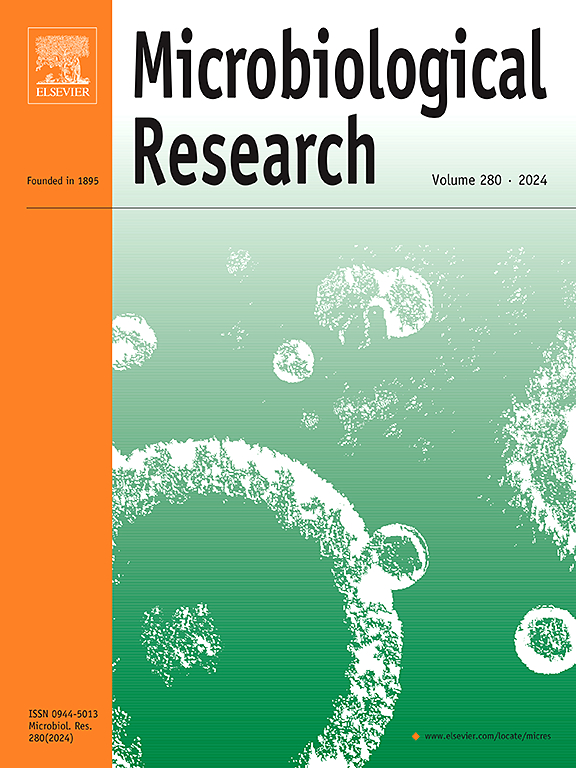种子内生微生物微囊杆菌 M15 可增强水稻(Oryza sativa L.)的耐寒性和生长能力
IF 6.1
1区 生物学
Q1 MICROBIOLOGY
引用次数: 0
摘要
种子内生微生物提高植物生长和抗逆性的潜力已得到公认,但由于这些微生物群落的复杂性,它们在缓解水稻冷胁迫方面的作用仍未得到充分探索。在这项研究中,我们调查了两个水稻品种--对冷敏感的 CB9 和耐寒的 JG117--种子内生微生物的多样性。我们的研究结果表明,与 CB9 相比,JG117 在冷胁迫和室温条件下都表现出更高的丰度。通过进一步分析,我们在 JG117 种子中发现了一种特殊的耐寒微生物--试管微杆菌 M15。接种了 M15 的 CB9 植物显示出更强的生长能力和耐寒性,在 14℃ 条件下,发芽率从 40% 提高到 56.67%,在冷胁迫(4℃)下的存活率从 22.67% 提高到 66.67%。此外,M15 还能显著提高叶绿素含量 30%以上,增加总蛋白 16.31%,降低丙二醛(MDA)水平 37.76%,提高过氧化氢酶活性 26.15%。总之,我们的研究强调了有益的内生微生物(如 M. testaceum M15)在提高水稻耐寒性方面的潜力,这可能会对寒冷易发地区的可持续农业实践和提高作物产量产生影响。本文章由计算机程序翻译,如有差异,请以英文原文为准。
The seed endophytic microbe Microbacterium testaceum M15 enhances the cold tolerance and growth of rice (Oryza sativa L.)
The potential of seed endophytic microbes to enhance plant growth and resilience is well recognized, yet their role in alleviating cold stress in rice remains underexplored due to the complexity of these microbial communities. In this study, we investigated the diversity of seed endophytic microbes in two rice varieties, the cold-sensitive CB9 and the cold-tolerant JG117. Our results revealed significant differences in the abundance of Microbacteriaceae, with JG117 exhibiting a higher abundance under both cold stress and room temperature conditions compared to CB9. Further analysis led to the identification of a specific cold-tolerant microbe, Microbacterium testaceum M15, in JG117 seeds. M15-inoculated CB9 plants showed enhanced growth and cold tolerance, with a germination rate increase from 40 % to 56.67 % at 14℃ and a survival rate under cold stress (4℃) doubling from 22.67 % to 66.67 %. Additionally, M15 significantly boosted chlorophyll content by over 30 %, increased total protein by 16.31 %, reduced malondialdehyde (MDA) levels by 37.76 %, and increased catalase activity by 26.15 %. Overall, our study highlights the potential of beneficial endophytic microbes like M. testaceum M15 in improving cold tolerance in rice, which could have implications for sustainable agricultural practices and increased crop productivity in cold-prone regions.
求助全文
通过发布文献求助,成功后即可免费获取论文全文。
去求助
来源期刊

Microbiological research
生物-微生物学
CiteScore
10.90
自引率
6.00%
发文量
249
审稿时长
29 days
期刊介绍:
Microbiological Research is devoted to publishing reports on prokaryotic and eukaryotic microorganisms such as yeasts, fungi, bacteria, archaea, and protozoa. Research on interactions between pathogenic microorganisms and their environment or hosts are also covered.
 求助内容:
求助内容: 应助结果提醒方式:
应助结果提醒方式:


